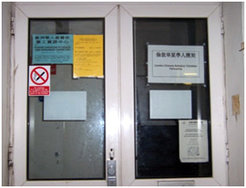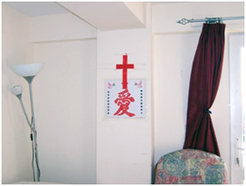Christianity, space and gender in the Chinese Christian community in the UK: tracing a trajectory
by Yuqin Huang
From October 2009 to January 2010, for 11 weeks or so, I was travelling around England, doing research on Chinese Christian community. This research interest was first prompted by my experiences of being converted and involved in a Chinese Christian church for four years in England. Due to my doctoral training in ‘gender and work’, my original concerns were about the gendered division of labor among Chinese missionaries, and how their experiences in Diaspora different from those of British missionaries who were in China 200 years ago.
This inquiry, however, was not well met in the field. It was indeed that single female missionaries greatly outnumbered single male missionaries. The wives of Chinese missionaries/pastors often lived on allowance which only amounts to half of their husbands’ salary. But it seemed they were content with that. There are many possible explanations. For example, these women were squeezed by the labor market in their home countries; the new contexts of Diaspora mission-field did not make many differences; or they ‘internalized’ the Christian ideology of self-sacrifice and held a ‘false consciousness’. Actually these explanations have been offered by existing literature, but in my case, I cannot confirm them due to the limitations of time, sample and the method of interview. Importantly, I had enough of these untestable assumptions and at some point, I was overwhelmed by anxieties that I might be unable to bring something new. The worries were aggravated by my realization that my previous research field had little to do with religion and I was unfamiliar with the new field.

My situation was somewhat changed at some point when I read my research diary. According to an earlier plan, I would visit 13 Chinese churches located in different parts of England. Apart from London where I stayed for several weeks, I stopped for several days in other cities/towns, attending their weekday religious activities as well as Sunday services. When I was reviewing the venues of those events, I realized a vast majority of them actually did not take place in a church or a public venue but in the private house of the pastors/missionaries or lay leaders. Despite more than 100 Chinese Christian churches in the UK, apart from a small proportion, most of them have no church property. Often they borrow/rent a room from a British church. Others rent commercial property. The rest neither own nor rent property, but attend a British church on Sundays, while differentiating themselves as a group from the British congregation by holding weekday activities. Without salient buildings with apparent marks, the majority of Chinese churches in the UK are unidentifiable.

More importantly, even for those who have their own ‘public’ place to go on Sundays, they hold weekday activities, such as ‘Bible studies’, ‘Youth group’ etc. at private homes. The more Chinese churches I visited, big or small, the more I felt the expansion of this community had been greatly relying on ‘private space’. Sunday services in Church were like a formal ritual; while more heart-touching communications/sharing, teachings/learning and laughs/tears were seen in private homes on the weekday gatherings. The road leading to conversions actually had been mainly paved in private houses. Some actually hold both weekday activities and Sunday worship at private homes, which makes them like ‘house churches’ in China. Certainly the reasons of their formation are totally different. In China, the government is afraid of the bigger influences Christianity will bring if the churches are brought from ‘underground’ to ‘over-ground’; from ‘private’ to ‘public’; while in England, ‘house church’ is a proselytizing strategy which is adopted intentionally to target the Chinese immigrants who are often in need of help, comfort and sharing. ‘House churches’ in England often try to act as a ‘surrogate home’ for new immigrants. I was often told by missionaries that they had to rent a big accommodation to make it like a ‘home’ for the immigrants when they were visiting; a good missionary must be a good cook as well, as free meals were often provided before the weekday events. Single female missionaries apparently have advantages over their male counterpart in this regard. This might supply one reason why much fewer single male missionaries are seen on the field. Those missionary wives take on this job while their husbands pay more attention to doctrinal teachings. My ‘gender-mainstreaming’ head led me to notice this proselytizing strategy was especially effective among female immigrants from mainland China among whom many not only were converted but determined to become a full-time missionary. I guess, under the socialist ideology, they are pushed to a still gender- biased ‘public sphere’ which is favorable to males; while in this overseas ‘private sphere’, their tensions were relaxed and their ‘hearts’ could be ‘more open to God’, and the function a ‘private home’ could bestow possibly also changed their stereotype on the ‘private/public’ dichotomy which gave more credit to ‘public (spheres)’ in China. For me, this observation could lead to a possible direction in exploring the complex intersection of Diaspora religion, space, gender and socialism. This seems an interesting possibility. While worrying that without a previous background in religious studies, I might lag behind too much, I consider this a comfort; and it is also a comfort to know that knowledge is transferrable.
Another important concern of feminists is the researcher-researched relationship. Due to the aforementioned unidentifiable nature of the community, it might be impossible for me to visit 13 churches within 11 weeks if I was not an ‘insider’. But some issues occurred due to my dual role as a researcher and an ‘insider’. For example, a ’sincerity’ problem emerged. Often when I attended those weekday events, I was asked to share my testimony of conversion. The missionaries expected me to be a fervent Christian and to give testimony to those unbelievers among whom many shared the similar background as me as a student from mainland China. But during that time, my ‘spiritual life’ was at its nadir, therefore I had little positive to say. I was then put into the tests of ‘sincerity’, and often failed by concealing my negative feelings. Another issue is about how to ‘protect’ the researched. Many ethical principles have been produced to prevent researchers from exploiting the researched for information, including to get the interviewees to sign a form to show they fully understand the context before the interviews. But I doubt the researched has been correctly protected. In my case, for example, due to my being an ‘insider’, during the interviews, it seemed my role as an information pursuer often went ‘invisible’ from their consciousness while they were talking, even though they had been fully informed. They told very personal and confidential stories which I think they would never mention if they were consciously aware that I was a researcher as well as a ‘sister’. Under this tricky circumstance, to what extent can we use their stories? Apart from being more careful, I have no good answer.













